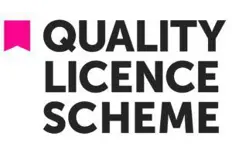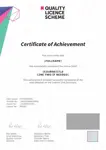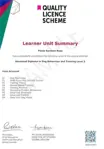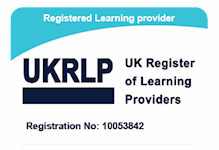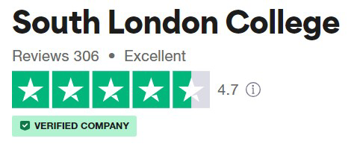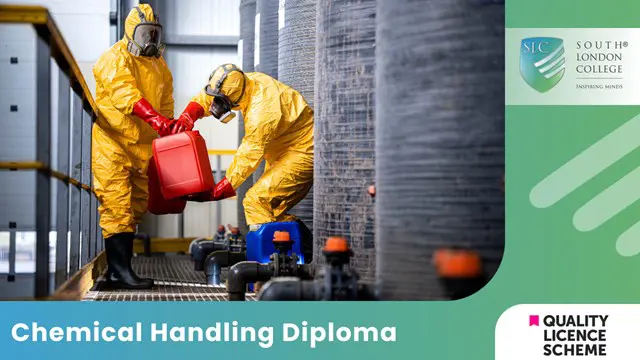
Chemical Handling Diploma - Level 4
Endorsed by Quality License Scheme | Endorsed Certificate Included | Globally Recognised
South London College
Summary
- Certificate of completion - Free
- Diploma in Chemical Handling at QLS Level 4 - Free
- Exam(s) / assessment(s) is included in price
Add to basket or enquire
Overview
Diploma in Chemical Handling - Level 4
Although some chemicals are harmless, there are some chemicals that are strong enough to pose mild or life threating injuries. Therefore, it is important for forensic scientists, laboratory technicians, chemists and other professionals working with chemicals to handle them in a proper manner, and this Diploma in Chemical Handling – Level 4 has been developed exactly for that. This Chemical Handling course will extensively prep you up to handle chemicals in a proper manner and to avoid laboratory mishaps.
This comprehensive Chemical Handling course will discuss about chemical handling and its importance. You will get to understand the importance of hazard communication in preventing accidents, after which the course curriculum will explore the United Nations Globally Harmonized System of Classification and Labelling of Chemicals (GHS).
Once you get into terms with GHS Physical Hazards and Pyrophrorics, this course will move onto educate you about the NEW OSHA Hazard communication standard (HCS). This Chemical Handling course will also focus on the different types of chemical hazards, Personal Protective Equipment (PPE) and the department specific hazard communication. By the completion of this Chemical Handling course, you will possess all the necessary knowledge and skills needed to handle chemicals like a pro.
The Chemical Handling course has been endorsed under the Quality Licence Scheme. The completion of this Chemical Handling course alone does not lead to a regulated qualification* but may be used as evidence of knowledge and skills gained. The Learner Unit Summary may be used as evidence towards Recognition of Prior Learning if you wish to progress your studies in this subject. To this end the learning outcomes of the course have been benchmarked at Level 3 against level descriptors published by Ofqual, to indicate the depth of study and level of demand/complexity involved in successful completion by the learner.
The Chemical Handling course itself has been designed by Imperial Learning Limited* to meet specific learners’ and/or employers’ requirements which cannot be satisfied through current regulated qualifications.
The Quality Licence Scheme endorsement involves robust and rigorous quality audits by external auditors to ensure quality is continually met. A review of courses is carried out as part of the endorsement process.
Please Note: This Course is Based on USA Standards
Eligible for TOTUM card - TOTUM is the #1 student discount card and app giving you access to exclusive student deals on food and fashion, tech and travel and everything in between.
*Regulated qualification refers to those qualifications that are regulated by Ofqual / CCEA / Qualification Wales
Achievement
Course media
Description
What Will I Learn?
- Understand what chemical handling is and its importance.
- Gain insight into Hazard Communication.
- Learn about the Globally Harmonised System.
- Learn about the United Nations Globally Harmonised System of Classification and Labeling of Chemicals (GHS).
- Learn about GHS Physical Hazards and Pyrophrorics.
- Gain insight into The NEW OSHA Hazard Communication Standard (HCS).
- Learn about the different types of Chemical Hazards and the Personal Protective Equipment (PPE).
- Learn about the Hazard Communication Program Summary Example and the department specific hazard communication.
COURSE CURRICULUM
★ MODULE 01 : Chemical Handling Introduction
- Solubility of Substances in Water
- Purpose of Coagulation
- The Coagulation Process
- Factors Influencing Coagulation
- Coagulants
- H2S Control –Traditional Wet Scrubbing using Chemicals
★ MODULE 02 : Hazard Communication Introduction
- Revised Hazard Communication Program
★ MODULE 03 : What Is The Globally Harmonized System
- Why did OSHA decide to modify the Hazard Communication Standard to adopt the GHS
- What is the phase-in period in the revised Hazard Communication Standard
- What are the major changes to the Hazard Communication Standard
- What Hazard Communication Standard provisions are unchanged in the revised HCS
- How will chemical hazard evaluation change under the revised Hazard Communication Standard
★ MODULE 04 : United Nations Globally Harmonized System
- What is the GHS
- Why was the GHS developed
- What was the International Mandate
- How will the GHS be maintained and updated
- When will the GHS be implemented
- What are the benefits
- How is the GHS to be applied
- Are all chemicals covered by the GHS
- Will all hazardous chemicals require a GHS label and Safety Data Sheet
- How will the GHS impact existing regulations
- What is meant by GHS Building Blocks
★ MODULE 05 : How The GHS Building Blocks By Should Applied
- Transport
- Workplace
- Consumer
- Pesticides
★ MODULE 06 : Hazard Classification
- Hazard Classification
★ MODULE 07 : What Are The GHS Physical Hazards
- Explosives
- Flammable Gases
- Flammable Aerosols
- Oxidizing Gases
- Gases under Pressure
- Flammable Liquids
- Flammable Solids
- Self-Reactive Substances
★ MODULE 08 : Pyrophoric
- Pyrophorics
- What are Bridging Principles
- Labels
★ MODULE 09 : Transport And Emergency Responders
- Agricultural Chemicals and Pesticides
- What are the GHS label elements
★ MODULE 10 : The New Osha Hazard Communication Standard
- Chemicals (GHS) Labeling and Classification
★ MODULE 11 : Different Types Of Chemical Hazards
- Common SDS Definitions
- Physical Hazards
- Hazardous Limits
★ MODULE 12 : Laboratory Use Of Hazardous Chemicals Section
- Laboratory Use Of Hazardous Chemicals Section
★ MODULE 13 : Laboratory Use Of Hazardous Chemicals Requirements
- Emergency and Personal Protection
- Chemical Hygiene Plan
★ MODULE 14 : Controlling Chemical Exposures
- Inhalation
- OSHA Respirator Standard
★ MODULE 15 : Personal Protection Equipment Section
- Personal Protective Equipment
★ MODULE 16 : Selection Guidelines For Head Protection
- Selection Guidelines For Head Protection
★ MODULE 17 : Hand Protection
- Hand Protection
★ MODULE 18 : Protective Clothing Applications
- Protective Clothing Applications
Access Duration
The Chemical Handling course will be directly delivered to you, and you have 12 months access to the online learning platform from the date you joined the course. The Chemical Handling course is self-paced and you can complete it in stages, revisiting the lectures at any time.
Method of Assessment
In order to complete the Diploma in Chemical Handling – Level 4 successfully, all students are required to complete a series of assignments. The completed assignments must be submitted via the online portal. Your instructor will review and evaluate your work and provide your feedback based on how well you have completed your assignments.
Certification
At the end of this Chemical Handling course successful learners will receive a Certificate of Achievement from the Quality Licence Scheme and a Learner Unit Summary (which lists the components the learner has completed as part of the Chemical Handling course.
Course Code: QLS-04872
Awarding body (Accreditation)
The Quality Licence Scheme has long-established reputations for providing high quality vocational qualifications across a wide range of industries. The Quality Licence Scheme combines over 180 years of expertise combined with a responsive, flexible and innovative approach to the needs of our customers. Renowned for excellent customer service, and quality standards, The Quality Licence Scheme also offer regulated qualifications for all ages and abilities post-14; all are developed with the support of relevant stakeholders to ensure that they meet the needs and standards of employers across the UK.
Who is this course for?
This Chemical Handling course is highly sought out by,
- Students
- Job seekers
- Chemists
- Forensic Scientists
- professionals who work with chemicals
- Anyone willing to learn how to handle chemicals
Requirements
The requirements to follow the course in Chemical Handling is as follows,
- Learners should be age 19 or over, and must have a basic understanding of Maths, English, and ICT.
- A recognised qualification at level 3 or above in any discipline.
Career path
- Chemist – £24,938 per annum
- Research Chemist – £29,046 per annum
- Forensic Scientist – £26,970 per annum
- Chemical Engineer – £32,414 per annum
Questions and answers
Currently there are no Q&As for this course. Be the first to ask a question.
Certificates
Certificate of completion
Digital certificate - Included
Diploma in Chemical Handling at QLS Level 4
Digital certificate - Included
Those who successfully complete the course will be issued the Diploma in Chemical Handling at QLS Level 4 by the Quality Licence Scheme.
Course Code: QLS-04872
Reviews
Currently there are no reviews for this course. Be the first to leave a review.
Legal information
This course is advertised on reed.co.uk by the Course Provider, whose terms and conditions apply. Purchases are made directly from the Course Provider, and as such, content and materials are supplied by the Course Provider directly. Reed is acting as agent and not reseller in relation to this course. Reed's only responsibility is to facilitate your payment for the course. It is your responsibility to review and agree to the Course Provider's terms and conditions and satisfy yourself as to the suitability of the course you intend to purchase. Reed will not have any responsibility for the content of the course and/or associated materials.

